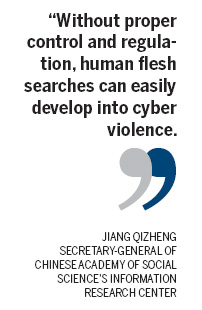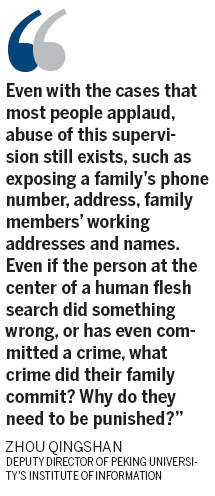Society
Human flesh search could turn predatory
By He Na (China Daily)
Updated: 2010-05-04 07:57
 |
Large Medium Small |
The power of 'crowd sourcing' can spiral out of control, Web experts say.
There is a popular saying among Chinese netizens that goes: If you love someone, use a human flesh search to put them to the test. If you hate them, use a human flesh search to put them in hell.
For the vast number of Internet users, the human flesh search - a literal translation of renrou sousuo - has become an effective tool in exposing corruption, infidelity and injustice.

Yet for every cheating husband or official who has been laid bare by the technique, media experts warn there is an innocent victim, with many people now using human flesh searches to attack celebrities, as well as get revenge on rivals and ex-lovers.

"Human flesh searches are turning into online lynch mobs," said Yu Hai, a sociology professor at Fudan University in Shanghai.
A human flesh search is effectively the same as what is known in the West as "crowd sourcing": Thousands of individual netizens piece together every detail of a person's life and then publish them online.
Unlike Google and Baidu, though, the power of this search engine is limitless - and has the potential to destroy lives, say analysts.
"There is no doubt that human flesh searches can have positive effects on supervising authorities. It has exposed dozens of corrupt officials and love cheats," said Zhou Qingshan, deputy director of Peking University's Institute of information. "But it is open to abuse and innocent people are seeing their private lives laid bare to the public in the name of revenge.
"At the moment, the issue is a mess and we need fresh legislation to protect personal data as soon as possible."

Searches are often triggered by media reports, photographs and videos posted either on popular blogs or online news websites, and often center on cases of injustice or reckless behavior. The fundamental problem, however, comes when the information in a story is false.
Yan Deli, a 31-year-old from Hebei province, saw her life turn upside down last June when her ex-boyfriend uploaded naked pictures of her, claiming she was an AIDS-infected prostitute. The post also included the phone numbers of 200 "clients" she had allegedly slept with.
After attracting the attention of thousands of netizens (the post was forwarded via most of China's social networking websites), it was not long before her full name, age, address and telephone number were made available on the Web. Even her family's details were exposed.
Yan lost her job and was afraid to leave her home. Her phone was also bombarded with abusive messages and even death threats.
By the time the police revealed the post was a hoax in October last year, investigators had found 157,000 Web pages, 6,420 online reports and 735 video clips about the "AIDS prostitute".
The victim underwent several blood tests - the results of which were released to the media - to prove she was free of AIDS. Her ex-lover, 32-year-old Yang Yongmeng, was sentenced to three years in prison last month after being found guilty of slander.
"I couldn't eat anything when I heard about this," said Yan Baoqi, 62, the victim's stepfather, who was also accused in the posts of raping Yan Deli when she was 15 years old. "I still find it very difficult to leave the house, even now."







